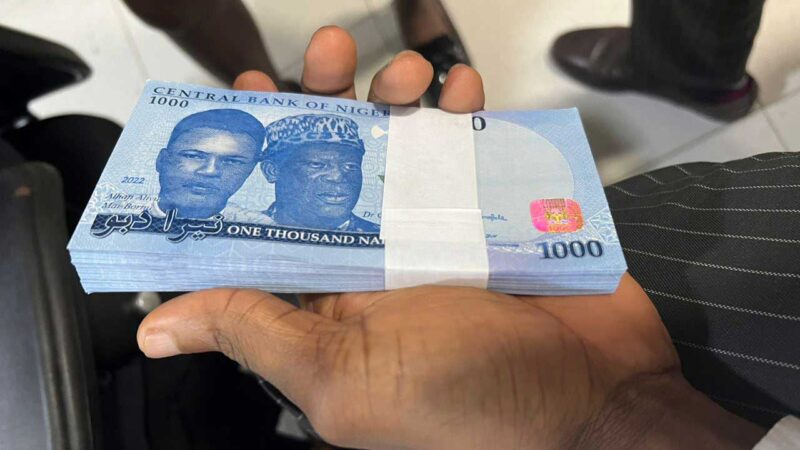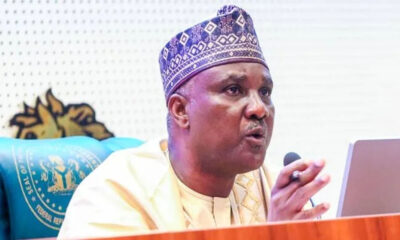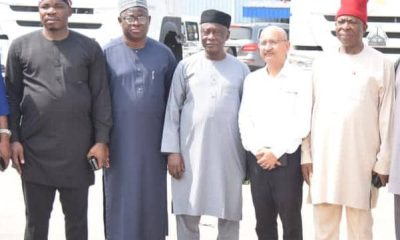News
Cement price: Dangote, BUA get Reps 14-day ultimatum

Cement price: Dangote, BUA get Reps 14-day ultimatum
The House of Representatives has issued a 14-day ultimatum to Dangote Cement, BUA, Lafarge Ashaka and other cement manufacturing companies in Nigeria to appear before it to make their submissions over the arbitrary increases in the price of the commodity nationwide.
The Chairman, House Committee on Solid Minerals, Mr Gaza Gbefwi, gave the directive at a public hearing to investigate the arbitrary increase in the price of cement in Nigeria by cement manufacturers, organised by House Joint Committees on Commerce, Industry, Special Duties and Solid Minerals on Tuesday in Abuja.
The PUNCH reported on March 13, 2024, that the House adopted a motion on the “Arbitrary increase in the price of cement by the cement manufacturers in Nigeria”, and constituted a joint committee to investigate and report back to it for further legislative action.
At the public hearing on Tuesday, none of the cement companies appeared or sent representatives to make submissions on their behalf.
Angered by the development, Gbefwi who represents Karu/Keffi/Kokona Federal Constituency, Nasarawa State, said the parliament was not in receipt of a court order restraining it from inviting anybody or companies for investigative purposes.
He said: “We are trying to see to the development of our country. Just as it was emphasized in the opening remarks, cement is to building what air is to every human being. In the human nature of the House, because we owe them a duty of care because they are equally Nigerians, we are giving them 14 days to make their submissions.
READ ALSO:
- Depressed Delta lady kills self over hardship
- CBN directs banks to start deducting cybersecurity levies from customers
- Olise scores twice as Crystal Palace trash Manchester United
If not, as we have sworn to uphold the constitution, we will use everything within our powers to make sure that Nigerians are not taken for granted and are not exploited. We will not sit back while some companies declare billions in naira and dollars every day while our people can barely afford to get a decent roof over their heads.”
“We have seen in Lagos where you have Nigerians under the bridge and paying rent. Why? If this product was available, I do not believe we would go to that length. Moreover, God has given to this nation, resources in abundance. So, this joint committee resolves to give them 14 days from now, and not 14 working days but 14 days to make sure that they make their submissions and appear before this House,” he said.
Earlier in his remarks, the Speaker, Abbas Tajudeen, represented by the Deputy Speaker, Benjamin Kalu, pledged the readiness of the House to come up with appropriate legislation to encourage the industrialisation of the country.
He also assured the companies invited for deliberations not to see their invitation as a witch-hunting mission, adding that the parliament was only interested in assisting in resolving the challenges in the building sector occasioned by frequent hikes in the price of cement.
He said: “We are committed to collaborating with both cement manufacturers and end-users, believing this is the most effective way to improve the quality of life and standard of living for our citizens. We are also dedicated to enacting laws that prevent a recurrence of the factors that led to the current situation.
“Our goal is to inform Nigerians about the industry’s current state and collaboratively find solutions to navigate the challenges. The persistent rise in cement prices has had a detrimental impact not only on the building environment but also on the entire economy. Cement is a fundamental component used in construction projects like bridges, dams, houses, waterworks, and road infrastructure. This makes addressing this issue paramount.”
Quoting research by the African Development Bank, Kalu said there is a housing deficit of up to 16.9 million units, adding that Lagos, Ibadan, Kano, and Abuja, have a 20 per cent rise in housing needs yearly. The current total output in the formal housing sector is estimated at not more than 100,000 units”.
READ ALSO:
- Start impeachment process against Fubara, Rivers APC tells lawmakers
- Gunmen kidnap 13 persons in Abuja, demand N900m ransom
- EFCC continues raids on BDC operators in Abuja amid naira decline
The Deputy Speaker asserted that bridging this gap requires affordable and accessible cement prices for both the government and the private sector.
“While factors like exchange rates have contributed to the price increases across various commodities, it is encouraging to see the positive results of the “Renewed Hope” administration’s policies under the leadership of Bola Tinubu. Notably, the naira has shown remarkable strength against the dollar in recent weeks, and Fitch Ratings, a global credit rating agency, recently revised Nigeria’s credit outlook to positive from stable”, he added.
Earlier in his welcome address, Gbefwi said that Nigeria has a high housing deficit of about 3 million units and a huge infrastructural deficit.
He stated: “Indeed the recent events that led to the skyrocketing of the price of cement in Nigeria has been worrisome and of great concern as it is inflicting untold hardship on Nigerians.
“To close this gap, both government and the private sector must be articulate and deliberate in putting the right policies and parameters in place that can promote, induce and or encourage development.
He added that the cost of cement is higher in Nigeria compared to other countries in Africa using the current exchange rate of the dollar to local currencies.
“Our review of cement prices in other countries like Kenya, India and Zambia for 2021 alone shows that Nigeria has the highest price of cement using the official exchange rates for each country. Nigeria’s price of cement doubles that of India at a difference of 69 per cent. Similarly, the price is 29 per cent higher than that in Kenya and 39 per cent higher in Zambia; hence the need for us to come together and find out why,” he added.
Cement price: Dangote, BUA get Reps 14-day ultimatum
PUNCH
News
Currency in circulation now N4.8tn – CBN report

Currency in circulation now N4.8tn – CBN report
Currency in circulation has reached an all-time high of N4.8 trillion as of November 2024, recording over seven per cent increase from the previous month.
Also, currency outside banks grew significantly in the same month hitting an all-time high of N4.6 trillion from the N4.2 trillion in the month of October.
These figures were contained in the money and credit supply data from the Central Bank of Nigeria (CBN).
The currency in circulation is the amount of cash–in the form of paper notes or coins–within a country that is physically used to conduct transactions between consumers and businesses.
It represents the money that has been issued by the country’s monetary authority, minus cash that has been removed from the system.
Similarly, currency outside a bank refers to cash held by individuals, businesses and other entities that is not stored in banks.
The currency outside the bank represents about 96 per cent of the currency in circulation.
Nigerians have in recent times been facing acute cash shortage with banks limiting daily withdrawal at Automated Teller Machines (ATMs) to N20,000 irrespective of the number of accounts held by an account owner.
READ ALSO:
- Cross River man kills mother, dumps body inside well
- El-Rufai mocks Reno Omokri with throwback protest photos against Tinubu
- Warri refinery: Marketers hopeful of further petrol price drop
According to the latest data, the currency in circulation grew by seven per cent to reach 4,878,125.22 from 4,549,217.51 in October.
Currency in circulation has grown steadily in the outgoing year 2024 with over one trillion naira added to cash in circulation after starting the year with N3.65 trillion in January.
In February, the currency in circulation slightly increased to N3.69 trillion representing an increase of N43 billion or 1.18 per cent from the January figure.
March also saw an appreciable increase to N3.87 trillion while it further increased to N3.92 trillion in the following month of April.
The growth trajectory continued in May with the currency in circulation increasing slightly to N3.97 trillion, an increase of N42 billion or 1.07 per cent while it reached an all-time high of 4.04 trillion, an increase of 2.11 per cent from May.
The July figure also rose marginally with the currency in circulation settling for N4.05 trillion before growing to N4.14 trillion in August and N4.43 trillion in September and N4.5 trillion in October.
In the same vein, currency outside banks grew from N4.2 trillion in October to N4.6 trillion in November, showing increasing preference for other means of storing outside bank deposits.
Economist, Dr. Paul Alaje attributed the development to the expanding money supply, adding, “Money supply is expanding but this may not necessarily be in cash. As it is expanding, it will necessarily induce inflation. But you can’t blame the people. People must look for money. How much was bottled water last year, how much is it today? All of this will induce inflation. If you now ask, what is the cause of inflation? Is it money supply itself or a devaluation policy? It is a devaluation policy. Money supply is an offshoot. So the Central Bank is raising interest rates to actually reduce money supply but the more they try the more money supply expands.”
He stated that the floatation policy of the CBN has created inflation, adding, “It is like chasing one’s tail and I don’t know if you are going to catch it.”
Currency in circulation now N4.8tn – CBN report
News
Tinubu not telling Nigerians the truth, says Sule Lamido

Tinubu not telling Nigerians the truth, says Sule Lamido
President Bola Tinubu has been accused of not being forthright about the true state of Nigeria under his administration.
Former Jigawa State Governor and senior Peoples Democratic Party (PDP) member, Sule Lamido, made the accusation while speaking on the BBC Hausa programme Gane Mini Hanya.
Lamido criticized both Tinubu and former President Muhammadu Buhari for what he described as a lack of transparency in governance.
“Buhari’s and Tinubu’s governments are not being transparent with Nigerians unlike during the time when PDP was in power where everything was transparent and open to all Nigerians,” Lamido said.
READ ALSO:
- Odili: Fubara prevented Wike from turning Rivers to private estate
- Putin apologises over Azerbaijan plane crash reportedly shot down
- 256 terrorists, two logistics suppliers arrested in one week – DHQ
He accused the two administrations of relying on propaganda rather than providing citizens with accurate information.
Lamido also expressed concerns over President Tinubu’s recent loan requests, questioning the logic behind them. “If Nigerians are being told the truth then there is nothing wrong with that, but how would you budget N30tn, generate N50tn and then request loan when you have a surplus of N20tn,” he said, referencing last year’s budget.
He described the situation as “reckless” and “selfish,” adding, “This recklessness and clear-cut selfishness is not done anywhere in the world, but yet you find (some) Nigerians supporting it. Visit social media and see how APC is being criticised, being referred to as calamity, yet you find some protecting it.”
Tinubu not telling Nigerians the truth, says Sule Lamido
News
Nigeria Customs Service begins 2025 recruitment [How to apply]

Nigeria Customs Service begins 2025 recruitment [How to apply]
The Nigeria Customs Service (NCS) has announced the commencement of its recruitment exercise, assuring Nigerians that the process is entirely free and fair.
The agency has cautioned the public to be vigilant against scammers who may attempt to exploit unsuspecting applicants during the recruitment period.
Applications are invited for positions in the Superintendent, Inspector, and Customs Assistant cadres as part of the Service’s plan to recruit 3,927 officers in 2025.
This initiative is aimed at enhancing trade facilitation and supporting Nigeria’s economic recovery efforts.
“Our recruitment is entirely free and fair. At no stage do we charge fees. Anyone requesting payment is a scammer,” the agency emphasized, urging applicants to be wary of fraudulent schemes.
READ ALSO:
- Dangote, Tinubu, Lookman, Badenoch named among 100 most influential Africans in 2024
- Heavy security in Ilesa as ex-Osun deputy gov emerges new Owa-Obokun
- Hacker has stolen N180m from my NGO account – VeryDarkMan cries out
The NCS outlined eligibility criteria, stating that applicants must be Nigerian citizens by birth, possess a valid National Identification Number (NIN), and have no criminal record or ongoing investigations.
Academic qualifications for the three cadres are as follows:
Superintendent Cadre: A university degree or Higher National Diploma (HND) along with an NYSC discharge or exemption certificate.
Inspectorate Cadre: A National Diploma (ND) or Nigeria Certificate in Education (NCE) from an accredited institution.
Customs Assistant Cadre: At least an O’Level certificate (WAEC or NECO).
In addition to these qualifications, the NCS stressed that all applicants must be physically and mentally fit, providing evidence of medical fitness from a recognized government hospital.
Nigeria Customs Service begins 2025 recruitment [How to apply]
-

 Politics3 days ago
Politics3 days agoGbajabiamila speaks on his rumoured Lagos governorship ambition
-

 metro3 days ago
metro3 days agoFarotimi to pursue disbarment over arrest, defamation allegations
-

 Business2 days ago
Business2 days agoReal reason Dangote, NNPC drop petrol price — IPMAN
-

 Health2 days ago
Health2 days agoABU Teaching Hospital will begin kidney transplant in 2025 – CMD
-

 Sports1 day ago
Sports1 day agoAnthony Joshua prostrates before Governor Abiodun during Ogun visit
-

 metro3 days ago
metro3 days agoEl-Rufai accuses Tinubu govt of Yoruba agenda, Reno Omokri reacts
-

 metro3 days ago
metro3 days agoNigerian govt urged to intervene in Mozambique post-election violence
-

 metro1 day ago
metro1 day agoN180m not missing from my account, it was all a plan – Verydarkman











